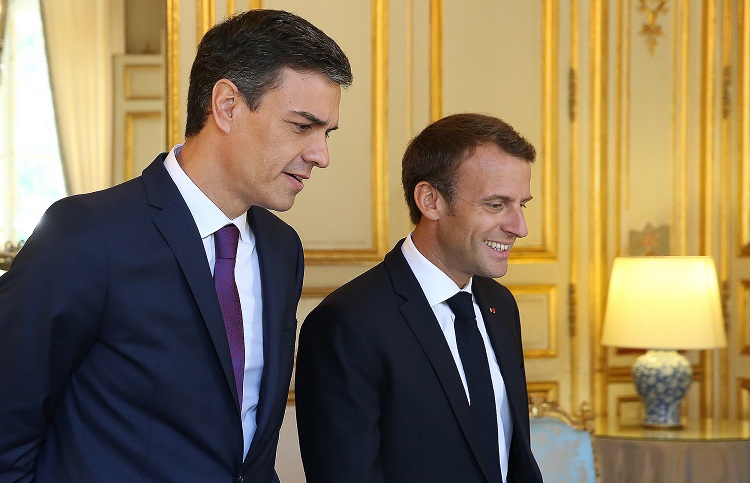Luis Ayllón
Spain and France will hold next March 15 their first bilateral summit since the one held in February 2017 in Malaga, The Diplomat has learned from government sources.
The summit will make the XXVIth between the two countries and will take place in France, although the teams of the two countries that are working on its preparation have not yet determined whether it will take place in Paris or in another French city.
It will be the first to be chaired by the head of the Spanish Executive, Pedro Sánchez, and by the French President, Emmanuel Macron, since in the one held four years ago, the leaders of the respective countries were Mariano Rajoy and François Hollande.
Sánchez and Macron have already met on several occasions, among others when, in June 2018, the former, recently elected president of the Government, went to the Elysée Palace to meet with the French president.
The difficulties that have arisen over these four years, especially the health crisis due to COVID-19 have been delaying the holding of a summit that is usually attended by a large number of ministers from the two countries.
On this occasion, however, the pandemic has made it advisable to significantly reduce the number of delegations attending the meeting. The intention is that the presidents and a couple of other ministers, at most, from each country, including the foreign affairs ministers, will attend in person, while the rest of those expected to participate will do so by telematic means.
Apart from the debates on matters arising from the health and economic crisis affecting the European Union, the most visible event will be the signing of the Dual Nationality Agreement between Spain and France.
The Agreement was reached in September last year by both governments, after negotiations that began in March 2019, with the aim of no longer requiring nationals of both parties to renounce their nationality of origin when they acquire the nationality of the other party. In other words, it will be possible to have both nationalities.
Spain has signed dual nationality agreements with: Chile Peru, Paraguay, Nicaragua, Guatemala, Bolivia, Ecuador, Costa Rica, Honduras, Dominican Republic, Argentina, Colombia, Equatorial Guinea, Philippines, Andorra, Portugal, Brazil, Cuba, Mexico, Panama, Puerto Rico, El Salvador, Uruguay and Venezuela.
France will be the first non-Ibero-American country with which Spain signs an agreement of this nature, something that both countries consider very relevant. During a trip to Paris in July by the Minister of Foreign Affairs, Arancha González Laya, to meet her French colleague, Jean-Yves Le Drian, she assured that the agreement “is a very clear signal to the more than 275,000 Spaniards living in France and a nod to the more than 125,000 French residents in Spain”.
The agreement will benefit, above all, the French residents in Spain, since France has been allowing Spaniards in their country to share both nationalities for some decades, without requiring them to renounce their nationality of origin, something that is required in other European countries.
However, no privileged ways of access to nationality are foreseen, nor a reduction in the number of years to obtain Spanish nationality by residence, which will continue to be 10 years for French citizens.







